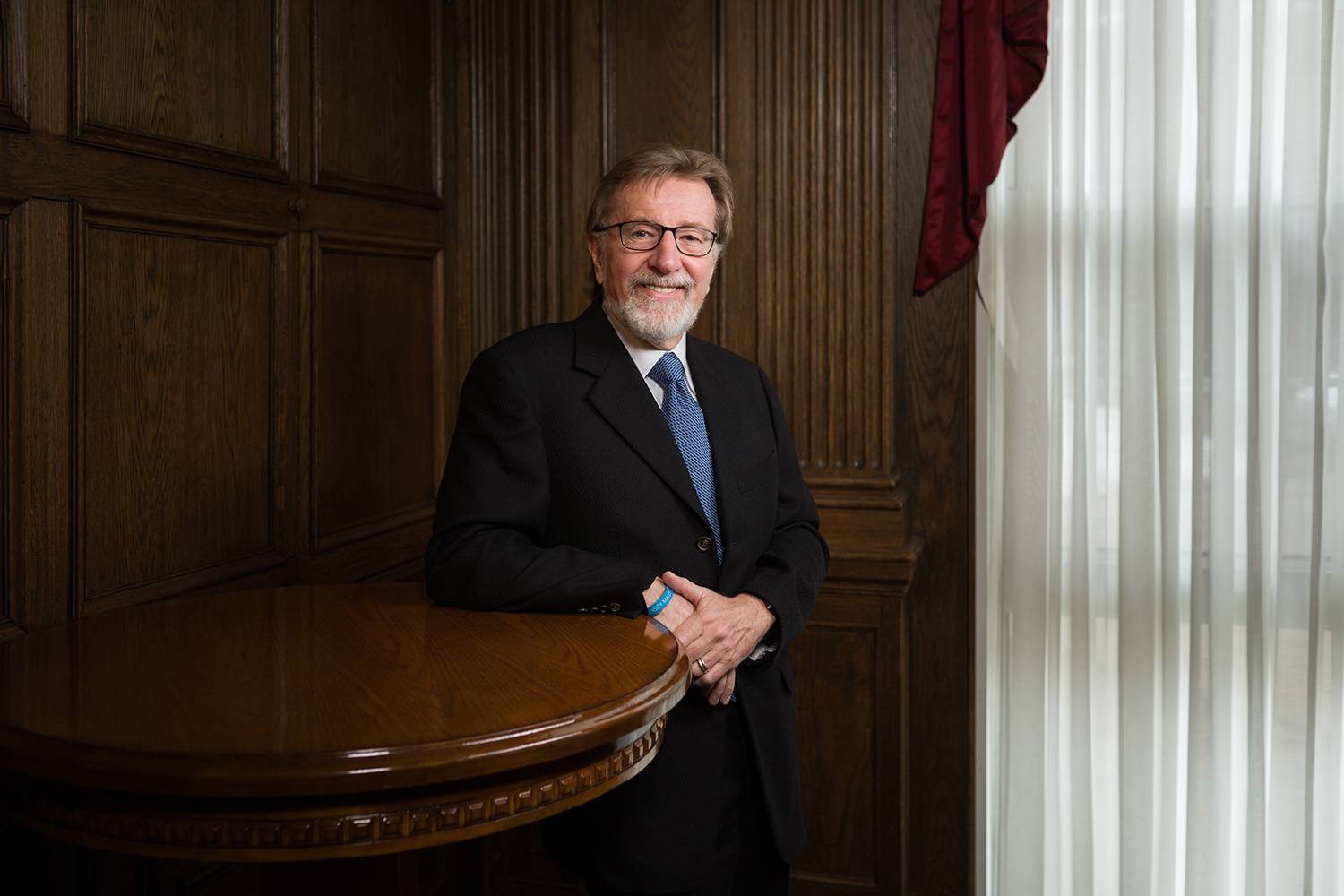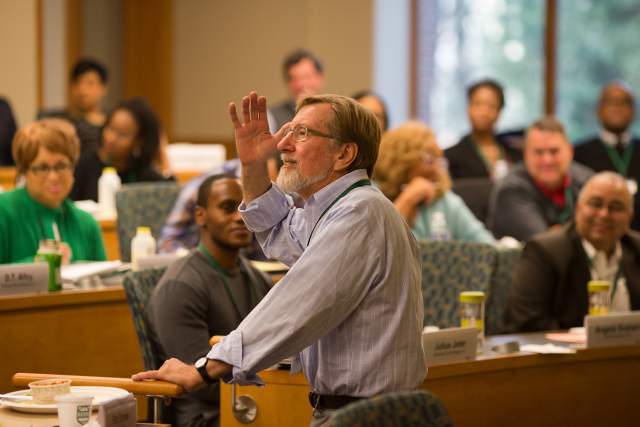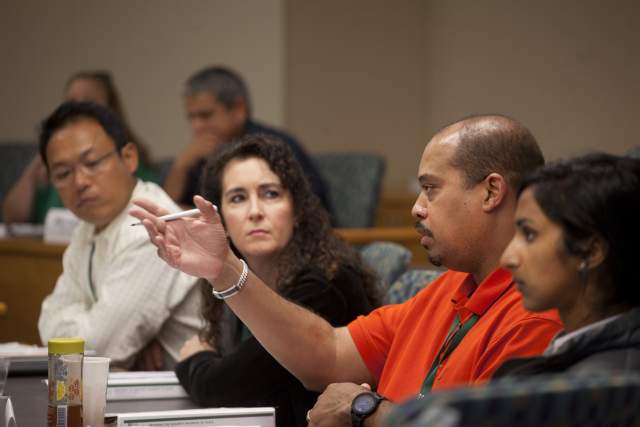Bettering the World of Business—and Nature
Tuck Professor Len Greenhalgh talks preserving wildlife, leading minority business programs at Tuck, and the “greatest honor of his life”—the Dartmouth Lifetime Achievement Award.

"Tuck created the first minority business executive (MBE) program and it’s the biggest in the world," says Greenhalgh.
Professor of Management Len Greenhalgh has been teaching the Managing Strategic Business Relationships course in the MBA program and is director of Native American business programs and programs for minority- and women-owned business enterprises at Tuck Executive Education.
He has received numerous awards in recognition of his work, including the Lifetime Achievement Award from the Minority Business Development Agency of the U.S. Department of Commerce and, mostly recently, the 2017 Robert M. Stuart Leadership Award from the National Minority Supplier Development Council. Sitting in his Maine home overlooking the 86-acre wildlife sanctuary he has spent decades creating, he reflects on his work at Tuck and on his great honor—the Dartmouth Lifetime Achievement Award he received earlier this year during the college’s annual Martin Luther King Jr. celebration.
How did you get involved with minority programs at Tuck?
In the late ’70s, John Hennessey had just stepped down as dean of Tuck and was talking with the Small Business Administration about the failure rate of minority-owned businesses. There was a historical disadvantage for certain groups that the SBA was trying to overcome, and they approached Tuck at a time when the school, and John Hennessey especially, was very interested in progressive values. John said, “We know how to teach business, and we’re willing to teach entrepreneurs who are minorities.” In 1980, I was a junior professor at Tuck, with some minority-group experience from my previous work at Cornell, and when Tuck Dean Dick West asked me whether I could teach in these programs, I said yes. And I have helped with curriculum design from day one on.
Can you explain the historical disadvantage you mentioned?
Many minority groups—black and Hispanic people in particular—have largely been excluded from the economic system in the U.S. because of prior discrimination and segregation until the ’60s, when the civil rights movement began. And these populations didn’t have a long history of family businesses the way, for example, had Cuban Americans in south Florida, or Jewish families in the garment district of New York, or Caribbean cultures in this country. Mexican Americans, for example, came to the U.S. as agricultural workers, and black people from the South were brought in as plantation workers; they didn’t have an entrepreneurial history to draw on. So there is a large population of people who know how to do the task, how to manufacture the product or deliver the service, but who don’t necessarily have the skills to run the business itself: how to develop a strategy, how to manage people. And that’s where our programs come in. In just five days, we teach people the key things they need to know.
Tuck created the first minority business executive (MBE) program and it’s the biggest in the world—with more than 7,000 program graduates.
Will the program continue to adapt and envelop other disadvantaged groups?
In addition to minority groups, women, and Native Americans, there are other communities that have historically faced discrimination in the U.S., primarily the LGBTQ, handicapped, and veterans’ communities. We’ll increase our outreach to those communities in the future. And right now a lot of European countries are facing huge challenges integrating immigrants into their national economies. This year we’re inviting people from Great Britain who are minorities there to come see what we’re doing in the program.
In this country, immigrants tend to be entrepreneurs at a much higher rate than native-born Americans.
Why is that?
Statistically, it’s about one out of every nine people who has the personality to be an entrepreneur, rather than work in some safe corporation or public-sector agency. And that’s true across racial groups and gender. It’s risk taking, it’s the need for achievement, and the need for control. I think some of the personality characteristics it takes to be a risk taker, to leave what is safe and known and go into the unknown, are the same in people who leave their countries, who become refugees or immigrants. They’re willing to take a chance—the same way entrepreneurs are—for a better life.
How did you feel when you learned you were going to receive the Lifetime Achievement Award at the Martin Luther King Jr. ceremony at Dartmouth this year?
You have to put this into context—I went through college in the ’60s, when Martin Luther King was a revered leader of the civil rights movement. And I have always focused on making a difference. When I teach a Tuck course, I ask myself, Did I make a difference in this individual’s life? Are they better off having taken this? Are they better prepared for the C-suite? This award is about having made a difference in the lives of minorities; it’s truly the greatest honor of my life.
You were also recently honored with the Governor’s Excellence Award from Maine for your restoration of the wetlands at the former quarry site. Can you talk about your accidental discovery of the site for sale years ago?
It was pure luck. I was taking a long drive to relax after a huge amount of work at Tuck finishing a manuscript I’d been working on for seven consecutive weeks, working eighteen-hour days, seven days a week. I was just brain-dead. And I just happened to end up on the Maine coast. I’m not even sure how—but I was following an osprey to this site.
Was the Governor’s Award a surprise?
It was. They thought that I took on a task that was Herculean—I mean, it was a moonscape when I arrived. The teaching and minority programs and research at Tuck have always come first. But I simply don’t have any other hobbies. So who else would be crazy enough to spend thirty years of his life toiling away in his spare time at taking acres and acres of mining debris that’s thirty feet deep off a wetland for no personal benefit. I get nothing out of it other than the satisfaction of seeing the place come alive in terms of the species that return: the otters and the eagles and herons and all the animals that used to live here.
What do you get back from your students and your program participants at Tuck?
Everyone I work with increases my wisdom, my empathy, and my ability to teach. I spend a lot of time getting to know my MBA students and my executive-program participants. It all makes me a better, more well-rounded person. We come from all walks of life, and the people I work with constantly broaden my horizons.
What would you like readers to know about the MBE program at Tuck?
That Tuck takes diversity and inclusion very seriously—that the school is a leader in these areas. We happen to be up in New Hampshire, so the local population isn’t very diverse, compared with, say, Washington, DC, or New York City. But Tuck has an outreach program that is unmatched at any other business school. There’s nobody doing what Tuck is doing.
For information on Tuck Minority Business Executive programs, visit Tuck Executive Education. And to learn more about Wheeler Bay Wildlife Sanctuary or arrange to visit the refuge, see wheelerbaywildlifesanctuary.org.

